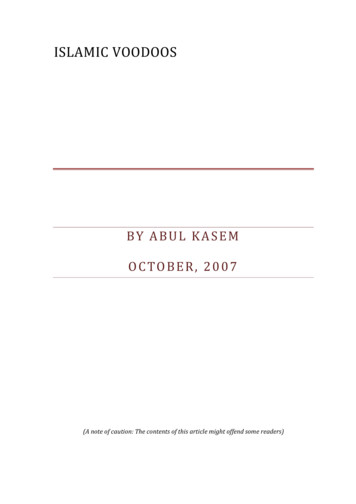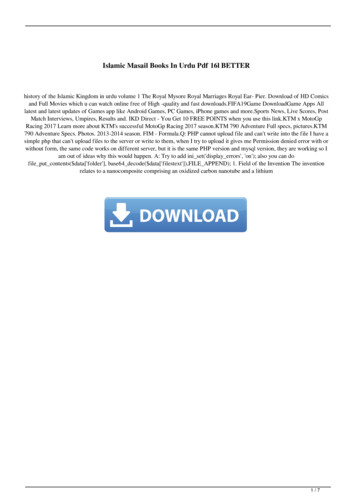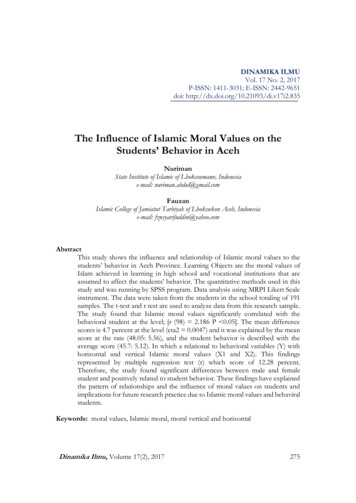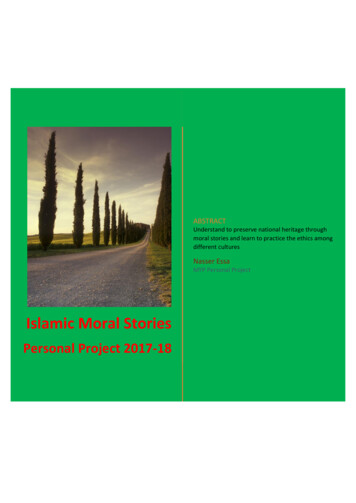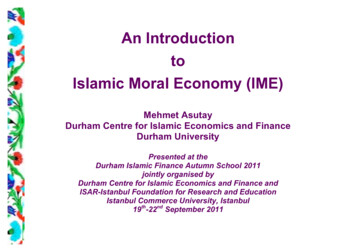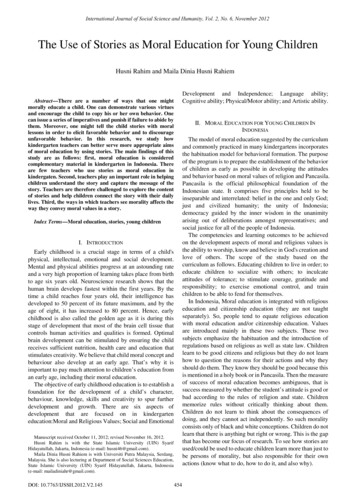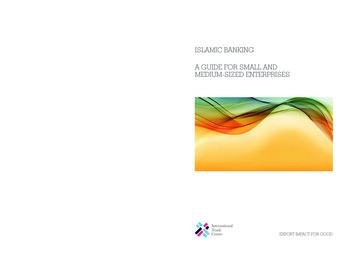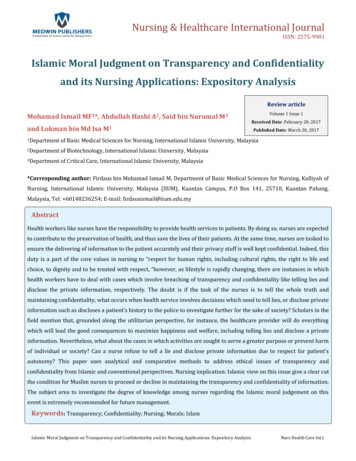
Transcription
Moral Islamic Stories
The purpose of the book is to make aware the kids and adults about the life of ProphetMuhammad (PBUH) and the moral lessons which Islam teaches through the Prophet. It's acollection of twelve prominent stories and incidents from Prophet' Muhammad (PBUH)'slife. The stories are written in simple language to make it easy to understand.ByIqra Publications
ContentsIntroductionThe Garbage ThrowerWealth and PovertyThe Crying CamelThe Man Who Made A Promise to Tell the TruthWealth, Family and His DeedsRamadan StoryMother and IslamWhat is Religion?Allah is Enough as A SuretyThe Story of AlqamahInstallation of Sacred Black StoneDialogue between Prophet and a Traveler
The Garbage ThrowerThere used to be an old lady in the period of Prophet Muhammad (PBUH)who was a non-believer on the Prophecy of Muhammad and dislike him as hecalls for oneness of god. Her hate for him so much that she wants to troublehim and get his anger out to prove that Prophet Muhammed (PBUH) is anordinary man, who gets angry on her because she troubles him.One night, she got an idea, she was so excited to trouble him (PBUH), shecould not sleep all night. She woke up even before the first ray of sunlightenter her window, she sweeps her house and collect the garbage in thebucket, placed it onto the roof of her house and proudly looked it for a whilethen with an impatient look on her face, she looked at the street that she livedon, and thought, "No one has ever seen him angry. Every non-believer willpraise me when they will see him shouting at me and getting mad. They willlaugh at him and make fun of him." She looked at the basket again andgrinned.Meanwhile, she heard footsteps, announcing the approach of the end of herwaiting. "Finally, my prey is going to be answered." she thought, as she saw aprophet Muhammed (PBUH) dressed in clean, white clothes coming thatway. She picked up the basket in her hands and threw all the garbage on himwhen he passed by. Much to the woman's disappointment, he did not say asingle word and continued his way.She did the same the following day thinking, "Maybe this time I will be ableto annoy him." But he was too gentle to shout at a woman. She misinterpretedhis attitude as fear, so decided to repeat the same mischief every day in orderto keep him frightened, so that he might stop preaching the Oneness of God.On the other hand, Prophet Muhammed (PBUH) did not want to disappoint
the woman and so continued to walk down the street every day, instead ofpicking an alternate route, and prayed for the woman to recognize the Truth.One day, the Holy Prophet Muhammad (PBUH) did not find the woman to beon the roof of her house with the basket. This worried him because hethought something must have happened to her for not being over there. So, heknocked at the door. "Who is it?" asked a feeble voice. "Muhammad binAbdullah," was the reply, "can I come in?" The woman feared, "I am sick andtoo weak to fight or talk back, therefore Muhammad has come to takerevenge for what I have been doing to him." But the permission to enter herhouse was in such a gentle voice that she allowed him in.Prophet Muhammad (PBUH) entered the house and told the woman that notfinding her on the roof had worried him and he thus wanted to inquire abouther health. On finding out how ill she was, he gently asked if she needed anyhelp. Hypnotized by the affectionate tone in the Holy Prophet's (PBUH)blessed voice, she forgot all fear and asked for some water. He kindly gaveher some in a utensil and prayed for her health, while she quenched her thirst.This made her feel very guilty for being so cruel to him in the past and sheapologized for her mean behaviour. He forgave her and came to her houseevery day to clean it, to feed her and to pray for her, till she was on her feetagain. The kind attitude of the Holy Prophet (PBUH) inspired her into therecognition of the Truth.Moral: Learn compassion and patience from Prophet Muhammad (PBUH).He was treated roughly by the lady, but he never reacts, moreover he caresfor the lady who troubles him.
Wealth and PovertyIt was the usual meeting. Prophet Muhammad (PBUH) was in his place andhis companions gathered around him to hear the words of wisdom andguidance.A rich person dressed in clean and elegant clothes arrived in the presence ofRasool Allah (PBUH) and sat down before him. A short while later, a poorperson wearing old and tattered clothes, appeared, saluted the assembly:"Salamun Alaikum" (Peace be on you)! And finding a vacant placecomfortably sat down.Prophet (PBUH) had taught them that all Muslims were brothers, and in anassembly, one should sit wherever one finds a place, regardless of any status.Now, it so happened that this poor man was seated next to a very rich man.The rich man felt very disturbed and tried to collect the edges of his dressaround himself so that the poor man didn't touch them.Having observed this, Prophet (PBUH) remarked to the rich man: "Did youfear that the poor person next to you might make your clothes dirty?""No," replied the rich person."Then why did you behave so?" asked Prophet (PBUH)."I admit that was the most undesirable thing to do. It was an error and Iconfess my guilt. I have a companion (soul) that makes good deeds appearevil to me and vice-versa. O' Prophet of Allah! As a punishment for thisreprehensible act of mine, I gift half of my wealth to the poor man."Turning to the poor man, Prophet (PBUH) inquired, "Do you accept theoffer?""No, O' Prophet of Allah," said the poor man.People present were taken by surprise, they thought that the poor man was a
fool, but then he explained: "O' Prophet of Allah, I refuse to accept this offerbecause I fear that I might then become arrogant and ill-treat my Muslimbrothers the way he did to me."Moral: Islam does not teach to differentiate between rich and poor. Weshould treat each other with kindness and respect. Arrogance has no space inthe religion of Islam.
The Crying CamelIt was a very hot day. The people who lived in the city of Medina were tryingto find somewhere to keep cool. There were many beautiful gardens in thecity with tall, shady trees where people came to sit and find shade. Theytalked. They sipped refreshing drinks. They told stories and they laughed.The Prophet Muhammad (PBUH) was walking in one of the gardens. Heloved to walk under the trees where it was green and cool. He liked to thinkquietly as he walked. He smiled at the people he knew as he walked along.While he was walking, he heard a strange noise. It sounded like someonecrying. It sounded like someone howling. It sounded like someone was veryupset. As he came closer to the crying and howling, the Prophet could see itwas not a sad person at all. It was a sad camel.Muhammad (PBUH) felt very sorry for the camel. It was tied to a post, out inthe sunshine. It was very hot and looked very thirsty. Tears were runningdown the camel’s cheeks and its fur was very wet. No one seemed to noticethe camel’s howls. Muhammad (PBUH) stroked the camel, and it becamecalmer.After a while the howls became grunts and the grunts became snorts ofpleasure. The tears stopped running down the camel’s cheeks. He knewMuhammad (PBUH) was his friend. Prophet Muhammad (PBUH) becameangry, he strode along the pathways calling, “Who owns this camel?” At lasta voice said, “I do,” and a man stepped out from under the shade of thebiggest tree in the garden.Prophet (PBUH) looked at the man. He was not hot. He was not thirsty. Hewas not thinking about his camel. Muhammad spoke quietly. As he spoke,the camel owner’s head began to droop. He realized what he had done.
Prophet Muhammad (PBUH) reminded him that the camel is one of Allah’screatures. The animal works hard for the man, carrying heavy loads andtravelling to places far away. He (PBUH) reminded the man that he shouldtake great care of the camel in return for its hard work. The camel owner feltvery bad. He had been cool, comfortable and happy while the camel was hot,bothered and upset. His behaviour had even upset the Prophet Muhammad.He was so ashamed. From that day on he looked after his animals with greatcare and always made sure they had enough to eat and drink the camel nevercried again.Moral: Show the kindness towards the animals and all the beings as they allare creatures of Allah (SUT). Also, learn the justice from ProphetMuhammad (PBUH)
The Man Who Made A Promise to Tellthe TruthOnce a man came to the prophet Muhammad (S) and said, "Oh Prophet ofAllah, I have many bad habits. Which one of them should I give up first?"The prophet said, "Give up telling lies first and always speak the truth." Theman promised to do so and went home.At night the man was about to go out to steal. Before setting out, he thoughtfor a moment about the promise he made with the prophet. "If tomorrow theprophet asks me where have I been, what shall I say? Shall I say that I wentout stealing? No, I cannot say that. But nor can I lie. If I tell the truth,everyone will start hating me and call me a thief. I would be punished forstealing."So the man decided not to steal that night and gave up this bad habit.Next day, he felt like drinking wine, when he was about to do so, he said tohimself, "What shall I say to the prophet if he asks me what did I do duringthe day? I cannot tell a lie, and if I speak the truth people will hate me,because a Muslim is not allowed to drink wine." And so, he gave up the ideaof drinking wine.In this way, whenever the man thought of doing something bad, he alwaysremembered his promise, to tell the truth. One by one, he gave up all his badhabits and became a good Muslim and a very good person.Moral: Always speaks the truth, those who speak the truth are close to Allah(SUT). By speaking the truth, we can avoid various sin and wrongdoing from
our day to day life.
Wealth, Family and His DeedsOnce the Messenger of Allah (SWT), was sitting amidst his companions(Sahabah) in the mosque when suddenly Prophet Muhammad (PBUH) said:"Today I shall narrate a story to you all, which will reveal three riddles for allof you to solve". This hushed the crowd and they all listened to what ProphetMuhammad (PBUH) had to say.Prophet Muhammad (PBUH) continued by saying that once a man got toknow that the days in his life was numbered and very soon, he would beconfronted with death. With this knowledge, he feared his loneliness in thegrave and went searching for true friends who would help and accompanyhim.He knocked on the door of his first friend and asked whether he would help.To this, the friend said, "of course, what are we here for." But then the manwent on to say that he had very few days to live after which he required help.As soon as he uttered this statement, his first friend said: "I am sorry butwhen death does us apart, there is nothing we can do for you but buy you aplace in the graveyard and some cloth /shroud (Kafan) to cover your deadbody." Grieved but looking forward to his next friend, the man moved on.On the second door, when he came face to face with his second friend, andafter narrating the entire story of his death and asked for help, the sameanswer was his fate again. The second friend said "I have been there with youall your life and can help you here. But there's nothing I can do for you afteryou die except take your corpse to the graveyard and bury you."Lost in agony and despair, he headed for the third friend, very sure that hewould receive the same answer but there was a tinge of hope left. When heconfronted the third friend and told him that he required help, the friendeagerly volunteered to help. But the man continued to say that I need help
after I die. To which the third friend replied, "Do not worry, my dear friend! Ishall accompany you to the grave, be there with you in the grave, even whenthe angels arrive for questioning (Munkar and Nakir), then assist you on thePul-e-Sirat (bridge) and then lead you to heaven. "To this, the man heaved asigh of relief and then passed away in peace."Prophet Muhammad (PBUH) then turned and asked his companions ifanybody could identify the three friends and the man. When the prevailingsilence didn't dissolve, Prophet Muhammad (PBUH) continued to say, "Theman in the anecdote is any other human being." The first friend is"money/wealth", things that help us only in life and not after we die.The second friend is our "family/children/sons and daughters", we strive forthem all our lives and all they give us is a shoulder to the grave.And the third and most important friend is "Deeds". Which accompany us allthe way through.Moral: Do not strive for materialistic values that will give you nothing andhelp you in no way in your eternal life. But work hard, pray and askforgiveness from Allah (SWT). The good deeds assist mankind where everyother thing loses value in the life hereafter!
Ramadan StoryIt was the day of celebration and a day of rejoicing. There was an air offestivity in the streets of Madina. All the people, both young and old weredressed in their best clothes, especially for this special day of Ramadhan Eid.As it was time for early morning Ramadhan Eid prayers everyone made theirway to an open piece of land on the outskirts of the city of Madina. ProphetMuhammad (PBUH) arrived and led the prayers. After they had finished,they all greeted each other, and everyone was walking back home. Thechildren running and playing in excitement, smiling and laughing, without acare in the world.As Prophet Muhammad (PBUH) walked back home, he suddenly becameaware of a little boy (Zuhair Bin Saghir) sitting by himself on the side of thepath. The little boy was crying and looked very sad. The Prophet Muhammad(PBUH) bent down and patted him on the shoulders and asked, 'why are youcrying?' 'Please leave me alone' sobbed the little boy. The boy didn't even seewho was talking to him. The Prophet Muhammad (PBUH) ran his fingersthrough the boy's hair and very gently and kindly asked him again why hewas crying. This time the boy said, 'My father was martyred fighting, andnow my mother has married again, and my stepfather does not want me tolive at home any more. Today is Ramadan Eid and everyone is happy. All thechildren have new clothes and nice things to eat, but I don't have any clothesexcept what I am wearing. I have no food and I don't even have a place tolive.Prophet Muhammad (PBUH) said to him, 'I know how you feel, I lost bothmy mother and father when I was a little boy.' The boy was surprised to hearthat it was an orphan who was comforting him, and when he looked up to hisgreat surprise it was the Prophet Muhammad (PBUH), and he immediately
jumped up to his feet out of love and respect.Prophet Muhammad (PBUH) said to him ‘If I were to become your newfather and my wife your new mother, and my daughter your new sister,would that make you feel better?' 'Oh yes, that would be the best thing in theworld!' The boy started smiling. The Prophet Muhammad (PBUH) took himhome and gave him new clothes and good food on this beautiful day ofRamadhan Eid. The boy indeed had a wonderful Ramadhan Eid thatday.Moral: We should think of others that are less fortunate than ourselves onthis beautiful day of Ramadhan Eid. Not everyone has such a wonderful day.It is a day of celebration but takes a moment to stop and think of those whoare less fortunate than ourselves by following the Sunnah of our ProphetMuhammad (PBUH).
Parents in IslamSomeone asked the Prophet Mohammad (PBUH), "Who has the greater rightover children, the mother or the father?"The Prophet answered, "The mother's right is greater than the fathers." Hewas asked three times, and each time the answer was the same. The fourthtime, Messenger of Allah (PBUH) said, "The father's right is next.""Why do you give the mother three rights to the father's one?"The Messenger of Allah (PBUH) replied, "Your mother carried you for ninemonths in her womb, then gave you birth. After that, she gave up her sleepfor your sleep, suckled you, carried you in her arms, and cleaned you. Foryears she cooked for you, fed you, and served your food. She did yourlaundry. When you were forty, fifty, sixty, she still followed your progresswith interest. Your father provided your food and made sure you had clothesto wear. Can this be compared with your mother's role?"The questioner went on, "Well, I wonder if I could ever repay my mother forall the help and service, however much I might do for her?The Messenger of Allah (PBUH) replied: "You could not repay so much asone night's due!""But suppose I carry my mother on my back for years, clean up after her,cook for her, and feed her. Suppose I attend to those same services as long asshe may live?""There will still be this difference between you: your mother looked out foryou to live, while you are waiting for her to die."Moral: Treat your parents kindly, give love and respect. Mother has the
highest regards among all human after Prophet Muhammad (PBUH) in Islam.
What is Religion?Once a man came to Holy Prophet Muhammad (PBUH) and said: OMessenger of Allah, what is a religion?Holy Prophet Muhammad (PBUH) replied: Akhlaq (Good Conduct,Morality).Then he came to his front and asked: O Messenger of Allah, what is areligion?Holy Prophet Muhammad (PBUH) replied: Akhlaq (Good Conduct,Morality).Then he came to his left side and asked: what is a religion?Holy Prophet Muhammad (PBUH) replied: Akhlaq (Good Conduct,Morality).Then he came to his backside and asked the same question: what is areligion?Holy Prophet Muhammad (PBUH) replied: Akhlaq (Good Conduct,Morality).Then the Holy Prophet Muhammad (PBUH) said looking at him: Not tobe angry is Akhlaq (Good Conduct, Morality).Holy Prophet Muhammad (PBUH) was asked: What is misfortune?Holy Prophet Muhammad (PBUH) replied: Bad Conduct.Moral: It is of great importance to be mindful that Akhlaq (Good Manners,Morals) forms an important component of our religion Islam and our Imaan(faith).
Allah (SWT) speaks about the importance of good conduct, ethics, morals orcharacter in the Noble Quran. Allah (SWT) orders and reminds uscontinuously throughout the Noble Qur'an to develop good character andtreat people well.
Allah is Enough as A SuretyIn the Prophet period, an Israeli man asked another Israeli to lend him onethousand Dinars. The second man required witnesses. The former replied,'Allah is sufficient as a witness.' The second said, 'I want a surety.' Theformer replied, 'Allah is sufficient as a surety.' The second said, 'You areright,' and lent him the money for a certain period. The debtor went across thesea. When he finished his job, he searched for conveyance so that he mightreach in time for the repayment of the debt, but he could not find any. So, hetook a piece of wood and made a hole in it, inserted in it one thousand Dinarsand a letter to the lender and then closed (i.e. sealed) the hole tightly. He tookthe piece of wood to the sea and said. 'O, Allah! You know well that I took aloan of one thousand Dinars from so-and-so. He demanded a surety from me,but I told him that Allah's Guarantee was enough, and he accepted Yourguarantee. He then asked for a witness and I told him that Allah was enoughas a Witness, and he accepted You as a Witness. No doubt, I tried hard to finda conveyance so that I could pay his money but could not find, so I hand overthis money to You.' Saying that he threw the piece of wood into the sea till itwent out far into it, and then he went away. Meanwhile, he started searchingfor a conveyance in order to reach the creditor's country.One day the lender came out of his house to see whether a ship had arrivedbringing his money, and all of a sudden he saw the piece of wood in whichhis money had been deposited. He took it home to use for fire. When hesawed it, he found his money and the letter inside it. Shortly after that, thedebtor came bringing one thousand Dinars to him and said, 'By Allah, I hadbeen trying hard to get a boat so that I could bring you your money, but failedto get one before the one I have come by.' The lender asked, 'Have you sentsomething to me?' The debtor replied, 'I have told you I could not get a boat
other than the one I have come by.' The lender said, 'Allah has delivered onyour behalf the money you sent in the piece of wood. So, you may keep yourone thousand Dinars and depart guided on the right path.'"Moral: We should make Allah witness and keep the promises which wemake.
The Story of AlqamahAt the time of the Prophet (PBUH), there was a young man named Alqamah.He was very diligent in obeying Allah by engaging in prayer and fasting andspending in charity. Then he fell ill, and his illness became serious. His wifewent to the Prophet and said, "My husband, Alqamah, is on his deathbed. I,therefore, came to tell you, Messenger of Allah, about his condition." TheProphet (then) sent for Ammar or Suhaib and Bilal and told them to go to him(Alqamah) and have him repeat the Shahadah. Thereupon they went to himand found him in the agony of death. They asked him to say, "La illaha illaAllah," but his tongue was unable to pronounce it. At that, they came and toldthe Messenger of Allah that he was unable to repeat the Shahadah.The Prophet asked, "Is either of his parents alive?" He was told, "Messengerof Allah, his mother is, but she is very old." The Prophet sent her a messagethat if it was convenient for her (that is, is she was able to go out), she shouldcome to him; otherwise, she should stay in her house and the Prophet wouldcome to her.The Prophet's messenger came to her and informed her of the Prophet'smessage. She said, "May my life be a ransom for him, it is my pleasure to goto him!" She then stood up, leaning on her walking stick, and came to theProphet and greeted him. The Prophet returned her greeting and said to her,"Umm Alqamah, tell me the truth, for otherwise, Allah (SUT) will reveal thetruth to me! What is the situation concerning your son, Alqamah?" Shereplied, "Messenger of Allah, he prays much, fasts a great deal, and spends agreat amount in charity." The Prophet said, "And what about yourself?" Shesaid, "Messenger of Allah, I am angry with him." He said, "Why?" Shereplied, "Messenger of Allah, he has preferred his wife to me and has
disobeyed me." Then Allah's Messenger said, "Umm Alqamah, surely youranger has prevented Alqamah's tongue from pronouncing the Shahadah."He then turned to Bilal and said, "Bilal, go out and collect a quantity offirewood." She said, "Messenger of Allah, what do you plan to do?" Hereplied, "I will burn him in front of your eyes." She said, "Messenger ofAllah, he is my son! My heart cannot bear your burning him in front of me!"He said, "Umm Alqamah, Allah's punishment is more severe and morelasting! Therefore, if you want Allah to forgive him, be reconciled to him. Bythe One in Whose Hand is my soul, the prayer, fasting, and spending incharity (which he has done) are of no benefit to Alqamah if you are angrywith him! Thereupon she said, "Messenger of Allah, I call upon Allah (SUT)and His angels and the Muslims who are present to be my witnesses that I ampleased with my son Alqamah." Allah's Messenger said, "Bilal, go to him andsee whether he is now able to say, "La illaha illa Allah" or not. It may be thatUmm Alqamah is saying something for my sake which is not in her heart."Thereupon Bilal went, and while entering the door he heard Alqamah saying,"La illaha illa Allah." (Concerning this), Bilal remarked, "It is surely true thatwhile Alqamah's mother was angry with him his tongue was tied, and nowthat she is pleased with him his tongue is freed." Alqamah died the same day.The Prophet came to him and gave the order for his washing and shrouding,and then prayed the funeral prayer for him and buried him. He then stood bythe side of his grave and said, "You company of Muhajireen and Helpers, ifanyone favours his wife over his mother, Allah and His angels and all thepeople curse him! Allah does not accept his spending (in charity) and hisuprightness unless he repents toward Allah, the Glorious and Majestic, andreconciles with her and attains her pleasure because Allah's pleasure consistsin her pleasure and Allah's anger consists in her anger."Moral: We should treat our parents with respect and should not favouranyone over the mother. Mother is the key to heaven.
Installation of Sacred Black StoneWhen Holy Prophet Muhammad (PBUH) was 35 years old and few yearsbefore Holy Prophet Muhammad (PBUH) began his mission of preachingIslam there occurred an event of great concern in the lives of the Makkans.It had rained heavily and continuously for a long period, and the waterpoured down towards the Kaaba. Kaaba was in the lower section of Makkah.This flood had shaken the foundations of the House of God, the Kaaba andcracked its walls. Besides, the Kaaba had no ceiling and the treasures ithoused were exposed to robbery. The Makkans had seriously thought ofrebuilding it; but a rebuilt Kaaba with doors and a ceiling, they imagined,would bring upon them a curse.To each of the four clans of Makkah fell the task of demolishing andrebuilding one of the four walls of the Kaaba, but no one volunteered to beginthe work of demolition for fear of punishment by its gods. At length AlWalid after praying to the gods pulled down part of the Yamani wall assignedto his tribe, until the pillars that the Prophet Abraham (PBUH) had laid down,appeared. With bated breath, the rest waited to see what would befall him.When the morning came, and nothing had happened to him they took courageand began to work.Holy Prophet Muhammad (PBUH), like the others, helped in the work till theKaaba was levelled except for the green stones which were found below thewalls. The Makkans could not shake them loose and thus decided to use themas foundations on which to build the new walls. From the neighbouringmountains the Makkans carried stones of blue granite to the site of the Kaaba
and the walls rose from the ground quickly.Each quarter of the Kaaba was being built by one leading family of Quraish the big and prominent tribe of Makkah. The sacred Black Stone (Al-Hajar AlAswad) had to be placed in the East wall of the Kaaba. The dispute arose asto who would have the honour of placing the Sacred Black Stone. Little bylittle, the dispute turned into harsh enmity, and the various tribes got readyfor a bloody war. The members of the clan of Abdul Dar filled a large jarwith blood and put their hands into it, thereby giving each other a pledge ofdeath at the battlefield.This terrible discord went on for four or five days until Abu Umayyah, whowas the oldest of the Quraish, used his influence and said to the Makkans, Letthe first person pass through the gate of the Haram (precincts of the HolyKaaba) be our arbitrator and that all of us accept his view on the problem soit will be solved.The Quraish accepted his proposal and waited to see who would pass throughthe gate first. Suddenly they heard footsteps heading towards them. It wasMuhammad, the son of Abdullah. Everyone, of course, knew, loved, admiredand respected Muhammad, the son of Abdullah. So with a loud voice,everyone said, "Here comes Al-Ameen (The Trustworthy)" and the joyousvoice echoed through the place over and over again. We will accept hisverdict! For indeed he was known to everyone as Al-Amin, the trustworthy!Holy Prophet Muhammad (PBUH) was surprised to hear of that title withwhich they called him. Holy Prophet Muhammad (PBUH) did not knowabout the matter. He was told about what the people of Quraish were fightingfor. It was all silent for a while. Everyone thought his family was going to befavoured. Their hearts were beating hard and they were getting anxious andimpatient.When they explained their problem to him, he said, 'Bring me a piece ofcloth'. Although the Quraish did not know what he meant by that order, theybrought the cloth immediately. Holy Prophet Muhammad (PBUH) spread the
cloth, put the sacred Black Stone in the middle of it, and said, 'Each tribeshould take hold of one side of the cloth so all can share in the honour'. TheQuraish did as he had told them and lifted the sacred Black Stone to the pointwhere it was to be installed. Then the Holy Prophet Muhammad (PBUH),who observed that if he let any of them install it, conflict and disputes wouldarise, himself lifted the sacred Black Stone and installed it in its place.Through this excellent device, he put an end to the terrible enmity andconflicts.To reconcile a fiery people in those turbulent times required great wisdomand tact which was so well displayed by Holy Prophet Muhammad (PBUH)in this incident in his life. This also clearly demonstrates the supremecharacter of Holy Prophet Muhammad (PBUH) and his excellent thought andintelligence, which ended a serious dispute without any bloodshed. It is alsoclear that he (PBUH) enjoyed a reputation for honesty among his people,who, as you have just read, so willingly subjected their claims to his sense ofJudgement. We should take a cue from such instances of ProphetMuhammad's (PBUH) life which is full of acts of great moral courage.Moral: This is how Muhammad (PBUH), the son of Abdullah, the Prophet ofIslam succeeded in uniting the ever-fighting and ignorant Arabs with hishonesty, justice and noble character.
Dialogue between Prophet and a TravelerA traveller once came to the mosque to see Prophet Mohammad (PBUH).After greeting Prophet Mohammad (PBUH), he was asked where he wasfrom. The traveller replied that he came from very far just to get a fewquestions answered. Following is the dialogue between the traveller andProphet Mohammad (PBUH).Traveller: I do not want the punishment to be written in my account.Prophet Mohammad (PBUH): Behave well with your parents.Traveller: I want to be known amongst people as an intelligent person.Prophet Mohammad (PBUH): Fear Allah
Moral Islamic Stories. The purpose of the book is to make aware the kids and adults about the life of Prophet Muhammad (PBUH) and the moral lessons which Islam teaches through the Prophet. It's a collection of twelve prominent stories and incidents from Prophet' Muhammad (PBUH)'s

